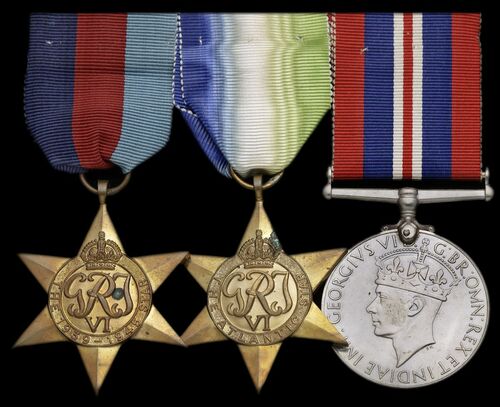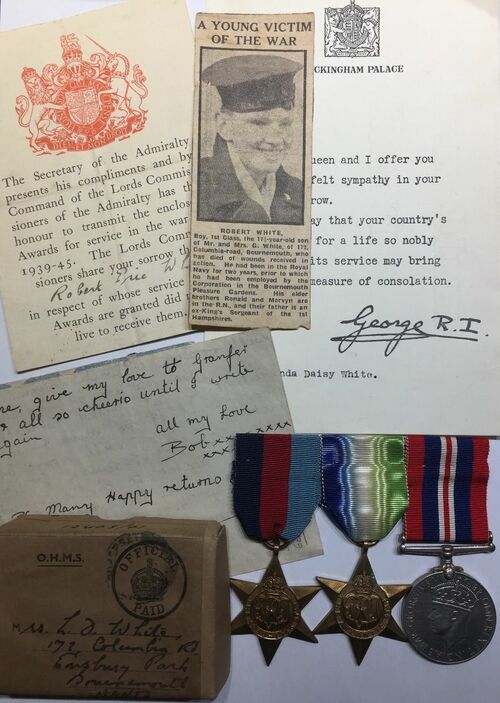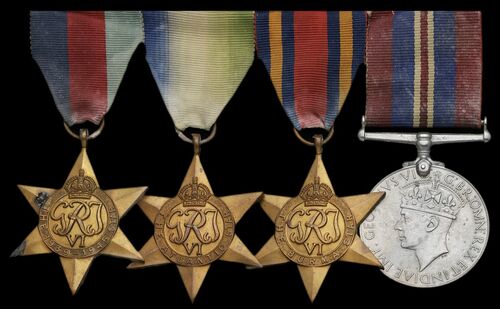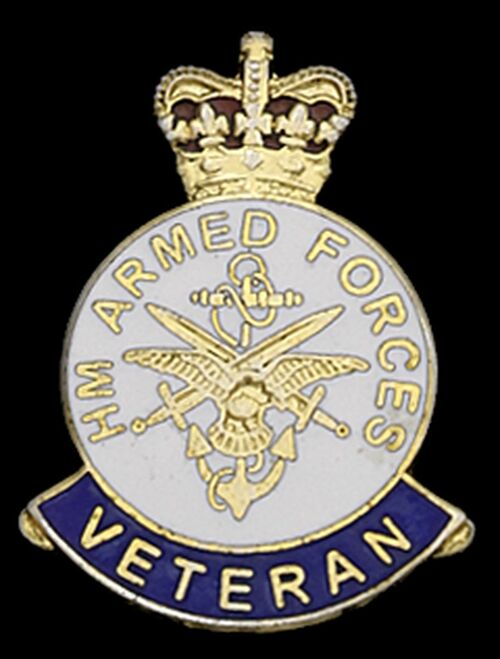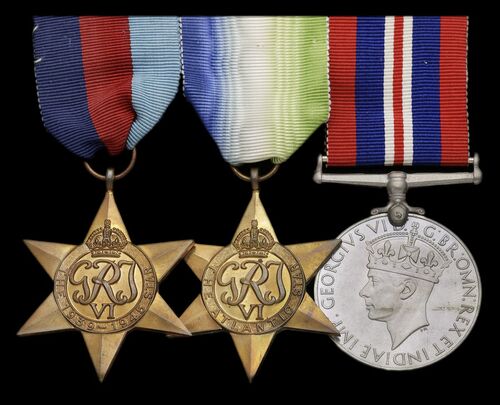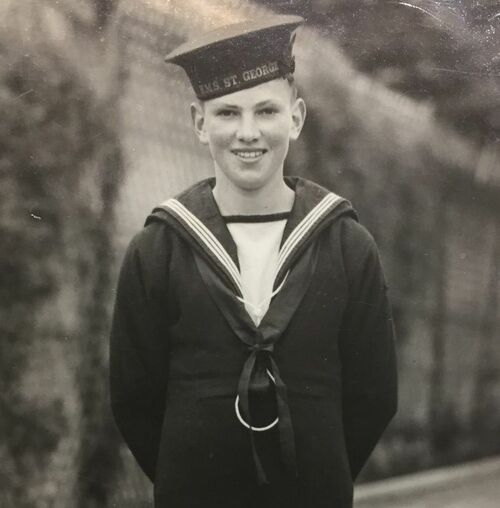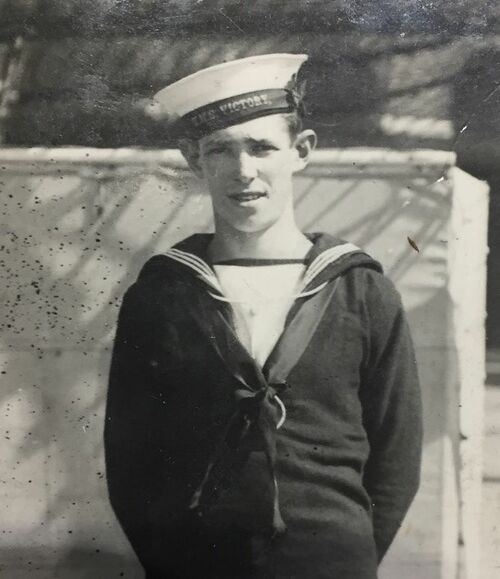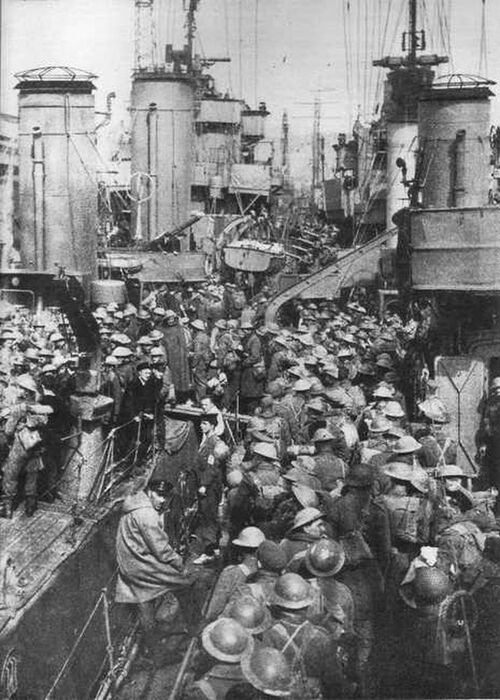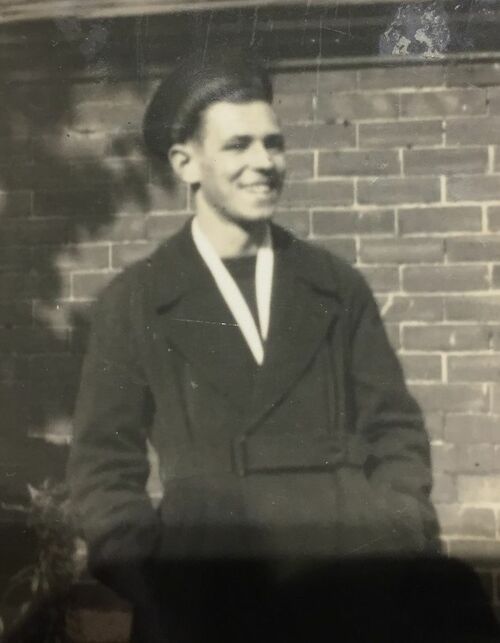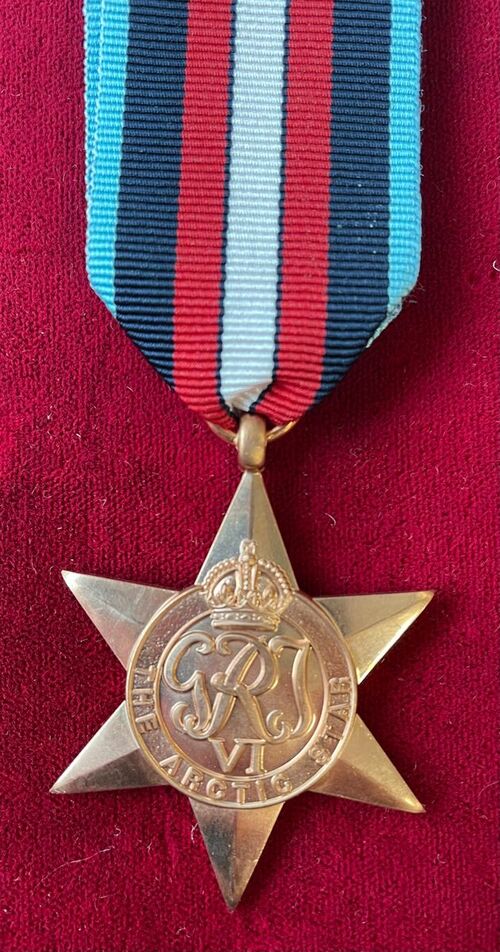Auction: 23001 - Orders, Decorations and Medals
Lot: 205
A notable family group:
The well-documented and poignant Second World War campaign group of three awarded to Boy 1st Class R. E. White, Royal Navy, who was just 17 years old at the time of his death from wounds, following the loss the cruiser H.M.S. Dunedin in shark-infested waters in November 1941
1939-45 Star; Atlantic Star; War Medal 1939-45, with original Admiralty and Buckingham Place condolence slips and O.H.M.S. card forwarding box addressed to his mother, Mrs. L. D. White, 172 Columbia Road, Ensbury Park, Bournemouth, Hants', extremely fine
Sold with a quantity of original documentation, including a letter from the Commodore, R.N. Barracks, Portsmouth, informing the recipient's mother of his death from wounds, dated 8 December 1941; Certificate of the Inspector of Seamen's Wills, allocating funds to his mother, dated 12 May 1942; letters to her from the recipient (2), dated 12 August 1941 and 11 October 1941, the latter written shortly before his death from wounds; telegrams home (2); a local newspaper obituary and portrait photograph.
The well-documented Second World War campaign group of five awarded to Able Seaman R. G. White, Royal Navy, who witnessed extensive action in the destroyer H.M.S. Anthony, including off Dunkirk and on the Arctic run
1939-45 Star; Atlantic Star; Arctic Star; Burma Star; War Medal 1939-45, good very fine, together with official Government Arctic Emblem lapel badge, in its box of issue
Sold with an extensive archive of original documentation and photographs, including his parchment Certificate of Service and his R.N. Trade Certificate, the latter revealing his role as a Leading Torpedoman; the recipient's hand drawn map of H.M.S. Anthony's movements during Operation "Ironclad", signed and dated 7 May 1942, together with a wartime copy of Admiral Syfret's 'Order of the Day' commending the gallant conduct of her crew; and a fine array of wartime photographs (approx. 60), some contained in a snapshot album and largely relating to the recipient's time aboard Anthony, including Dunkirk and the Arctic run.
The Second World War campaign group of three awarded to Able Seaman M. H. White, Royal Navy, who served in the escort carrier H.M.S. Ravenger on the Atlantic run
1939-45 Star; Atlantic Star; War Medal 1939-45, with Admiralty slip and original O.H.M.S. card forwarding box addressed to 'Mr. M. H. White, 172 Columbia Road, Ensbury Park, Bournemouth, Hants', one side of which is inscribed with his service number 'JX. 322422', extremely fine (12)
Robert Eric White was born in Poole, Dorset on 11 April 1924, the son of Gordon Hatfield White and Linda Daisy White, and initially found employment in Bournemouth's Pleasure Gardens. On the outbreak of hostilities, however, he entered the Royal Navy as a boy rating and he was likewise employed at the time of his death in November 1941.
The cruiser H.M.S. Dunedin departed the U.K. for the South Atlantic in April 1941 and captured of the enemy tanker Lothringen at the end of the following month, aboard which was discovered important Enigma materiel.
On 24 November 1941, however, she fell victim to a torpedo strike delivered by the U-124, when north-east of Recife, Brazil. Two torpedoes hit within seconds of each other, the first striking amidships, wrecking the main wireless office, the second further aft, probably near the officers' quarters. The first hit sent the ship lurching to starboard, the second caused even greater damage, dismounting the after 6-inch gun, and blowing off the starboard screw. Immediately men began to abandon ship, jumping over the side to the Carley floats and any available debris. Dunedin turned on her beam ends and sank in about seventeen minutes.
Shortly after the sinking, U-124 surfaced and circled the survivors. The U-boat was on the surface for no more than ten minutes before diving but, while the survivors waited to see what was intended, and as a spontaneous act of defiance, they sang "There will always be an England".
In the water, up to 250 men from a ship's complement of nearly five hundred struggled to haul themselves on to the Carley floats and anything else that would float. Seven Carley floats got away. For the next 78 hours, their numbers dwindled in the equatorial heat. Some men died of their injuries sustained when the torpedoes hit, some died of exhaustion, some went insane, others drowned, and some were killed by sharks.
When, in the late afternoon of 27 November, the Nishmaha, a U.S. merchant ship en route from Takoradi to Philadelphia, happened upon the six remaining Carley rafts, only 72 men were still alive. Five would subsequently die before the Nishmaha reached Trinidad, leaving just 67 out of the original complement of around 500 officers and ratings.
One of the five who died aboard the Nishmaha was 17-year-old Robert White, who succumbed to his wounds on the 28th. He was buried at sea and is commemorated on the Portsmouth Naval Memorial.
Ronald Gordon White was born in Poole, Dorset on 2 September 1920, the son of Gordon Hatfield White and Linda Daisy White, and entered the Royal Navy as an Ordinary Seaman in August 1939. Following his initial training at the shore establishment Victory, he joined the destroyer H.M.S. Anthony in November of the same year, and he remained likewise employed until December 1942.
As part of the 16th Destroyer Flotilla, Anthony played a prominent role in the evacuation of Dunkirk, rescuing over 3,000 troops, but on 30 May 1940 she was damaged by enemy aircraft and had to return to port for repairs.
Anthony was next assigned to the 12th Destroyer Flotilla and it was in this capacity that she rescued survivors from the City of Benares in September 1940. The loss of the latter ship - to a torpedo attack delivered by the U-48 - resulted in the death of 77 child evacuees, an incident that sent shock waves through the home press and brought about an end to the Children's Overseas Reception Scheme (C.O.R.S.).
Having then served as an escort to the Hood and the Prince of Wales during the pursuit of the Bismarck in May 1941, Anthony participated in the trail-blazing Arctic convoy PQ. 1 / QP. 1.
Then in late March of the following year, she was assigned to Force H in support of Operation "Ironclad", the assault on Vichy French held Diego Suarez, Madagascar. At a crucial moment in the operation, the assaulting force met unexpectedly severe resistance and Admiral Syfret dispatched Anthony to make a dash past the harbour defences and land 50 Royal Marines in the rear of the enemy positions. The latter caused a 'disturbance in the town out of all proportion of their numbers' and the Vichy defence was soon broken.
Having come ashore just before Christmas 1942, White returned to sea in the cruiser Emerald in the period March-November 1943. His final wartime seagoing appointments were in Paladin (May 1944-March 1945) and Pathfinder (April-May 1945), in which period he qualified for his Burma Star. He was released 'Class A' in October 1946 and died in Bournemouth, Dorset on 25 April 2007.
Mervyn Hatfield White was born on 24 October 1922, the son of Gordon Hatfield White and Linda Daisy White, and entered the Royal Navy as a rating following the outbreak of hostilities. As evidenced by around 20 accompanying wartime photographs, he subsequently witnessed active service in the escort carrier H.M.S. Ravager on the Atlantic run. He died in Bournemouth in August 1995.
See Lot 113 for the Great War medals awarded to their father, Sergeant George Hatfield White, Hampshire Regiment.
Subject to 20% VAT on Buyer’s Premium. For more information please view Terms and Conditions for Buyers.
Sold for
£850
Starting price
£480

